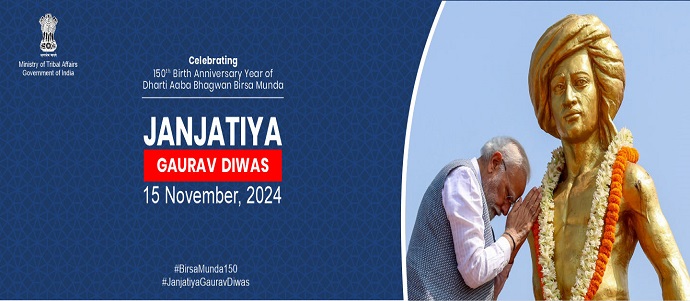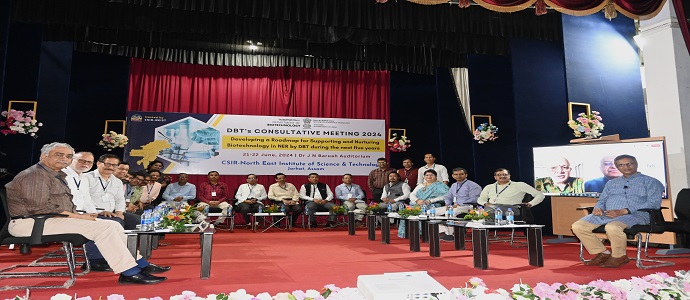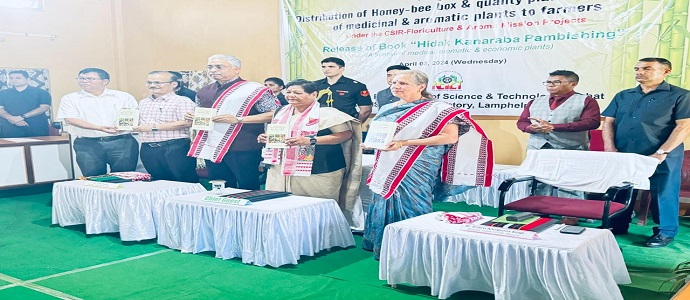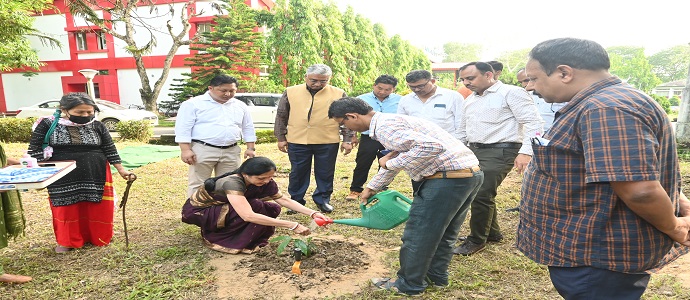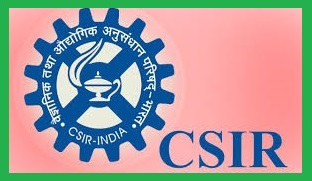Cultivation of Mushroom for livelihood generation
This is one of the flagship programmes of NEIST-Jorhat. It has created many small and micro entrepreneurs and has provided income and nutrition to the beneficiaries. As the inputs are cheap and easily available, it can be easily adopted by rural people where such resources are available. The programme has covered huge geographical areas. However, in the absence of post-harvest technological interventions and established market linkages the full potential of the programme remains unexplored. The beneficiaries’ responses about the program were mostly positive. The average of support and impact data showed that their income and life style had improved significantly. Overall perception about the programme was also optimistic and beneficiaries were of the opinion that training of CSIR-NEIST and the economic impact from it was appreciably good.According to the beneficiaries, improvement to the training programme was necessary. Beneficiaries denied any negative impact on health due to involvement in the mushroom cultivation programme.
Production of Vermicompost for livelihood generation
The rural population mainly of Arunachal Pradesh and few neighboring villages of Assam in Lakhimpur districthave adopted the vermicomposting technology under the guidance of the CSIR-NEIST Branch Laboratory at Itanagar. The programme has been able to generate participation from numbers of societies and self-help groups especially in Arunachal and out of which few rural entrepreneurs like Mr.NabamTagu and Mr. Bhaskar Borah have gained considerable commercial success. This shows the positive impact of the programme on rural population. The low investment, utilization of cheap raw material like cowdung, household organic waste and high turnout has made the programme acceptable for rural population; however few concerns about market outreach were expressed by the beneficiaries.
S&T Interventions to Combat Malnutrition in Women and Children
The programme has benefited 180 villagers and 150 families from Bokajan, Tezpur. As this is a new programme, the expectations of the stakeholders are high. From the field survey, it was felt that it would be more fruitful for the programme beneficiaries, which mostly include tea garden workers, if the frequency of interventions is increased. Also, timely assessment of various health parameters of the beneficiaries such as weight, hemoglobin content, body mass index etc. is required to further observe the long term benefits of this intervention. The programme has high potential to bring social transformation in future as this community belongs to one of the most economically weaker section. Further if the model is successful the same can be scaled up as there are numerous such villages in the state of Assam, which has over 600 tea gardens. From this point of view this is a very important and relevant programme.
Exploration, documentation & screening of microbial bioresources of Indo-Burma hot zone
An entrepreneur (Dilip Chandra Talukdar) was interviewed by the survey team. He has started production of TP-16 bifertiliser through his company called Amrit Organics located at TingraiChariali, Panbari, Duliajan. CSIR-NEIST has earned a total of 2.5 Lakhs as license fee as against the investment of Rs. 28.9 Lakhs.With this technology, Amrit Organics has provided employment to 20 persons as detailed below. The product is marketed in approx. 1 00 villages and has been used by about 700 cultivators. i. Direct employment: 6 people. (2people, in the plant, 4people in own Tea Garden ~ 26 bighas) ii. Indirect employment: 14people
Development of Liquid Deodorant Cleaner Technology
The technology for production of Liquid deodorant cleaner is simple and eco-friendly. Raw materials and chemicals used in the formulation are indigenously available, no by-products are generated and it is a low capital investment with quick returns. It can be set up in cottage scale level at rural areas. The technology has benefitted 17 entrepreneurs and about 50 individuals (20 males and 30 females between the age group of 20-40 years) have been trained in the know-how.
Development of Low Dust Chalk Pencil Technology
Low dust chalk pencil developed by CSIR-NEIST is a small but very popular technology meant for the first generation and established entrepreneurs. The process does not require electricity and the consumption of water is also less and can be setup in mechanized and in manual form. The capital investment for setting up a unit is also very less. It is an appropriate technology that can be set up in any rural area. Thus, it helps in employment generation and at the same time it has higher impact in the societal development. The most significant characteristic of this technology is that it does not produce any waste during production of low dust chalk pencil. Therefore, the technology for low dust chalk pencil is eco-friendly too and does not cause health hazards. This programme also underwent technology upgradation in 2007. The technology has benefitted 38 entrepreneurs and about 80 individuals (30 males and 50 females between the age group of 20-40 years) have been trained in the know-how. Many of these firms have gone into commercial production and the product has received huge response in the market as evident from the feedback and appreciation letters sent as a mark of gratitude. The story of Mr. PratimJyoti Baruah (M/s P B Suppliers, Sivasagar) is quite inspiring in this regard. He disclosed that as an unemployed youth he was greatly benefited by this process technology. Initially he started with a small die sourced through CSIR-NEIST and as sales increased he went on to buy a bigger sized second-hand machine from Rajasthan. His hard work, zeal and enthusiasm have brought success to this low dust chalk technology. Recently he has procured a high capacity sophisticated manufacturing facility to produce high quality low dust chalk pencils to compete with market leaders in this sector. Interestingly, he uses the same original formulation he procured from CSIR NEIST, Jorhat. The Cellulose Pulp and Paper Division, CSIR-NEIST, continues to provide him the necessary guidance in his endeavour to scale up this technology. As per his inputs his sales volume has grown over the years and has made his venture highly profitable.
Setting up a Common Facility Centre (CFC) on weaving and textile product manufacturing
It was observed that this programme is well designed and has within a short time become very popular amongst the beneficiaries. About 315 women have benefitted under CSTRI project and 138 women weavers under CSIR-800 project. The activity has gained a huge interest among the rural women population of the New Sonowal and Teok area. The products from the weaving center have reached the markets of Jorhat town through retail outlets of the associate NGO named SNEHPAD (Society for North East Handmade Paper Development). Also the products from the weaving centers have been exhibited at different trade fairs like Mahila-E-haatorganized by RashtriyaMahilaKosh, Surajkund International Crafts Mela, Haryana etc. The engagement of village women with commercial production of textile has open up new prospects among them as many of the weavers expressed their willingness to join marketing profession if necessary training is provided.However, it is too early to measure the impact of the programme as sustainability isyet to be ascertained. The perception mapping of stakeholders has indicated that they are very satisfied with the programme . In case of support and impact of the programme also, the indicators that ranked very high indicated the intervention was useful for the beneficiaries and they were open to involve more people around their social circle in this programme. The programme has significantly empowered women and has given additional income to the family. Special mention must be made that this programme has been able to help the weaker section of the society including many people from scheduled tribe.
Citronella Cultivation in North-East India
The success of the Citronella cultivation can be realized from the fact that Assam where CSIR-NEIST supported its cultivation is the leading producer in India. Initially citronella got huge importance among the tea gardens of Assam as they used it for soil rehabilitation in tea planting lands. Besides this, left over distilled citronella grass is also use as mulching material in tea cultivation to suppress the growth of weeds and retain soil moisture (S. Sahoo, 2001). Apprehending the huge potential of citronella cultivation, institutions like SIBDI and NEDFI formulated scheme to uphold Citronella cultivation in Assam and North-east where CSIR-NEIST was functioned as prime Know-how supplier (NEDFi and SIBDI web-resource).This program is noticeably the most successful programme of the institute and has been recognized and applauded regionally as well as nationally. It was awarded the FICCI Award for Science & Technology in 1982 and FICCI Award for Rural Development in 1985. Its success is also indicated by the increase in the no. of beneficiaries every year.
Technopreneur Promotion Programme outreach cum Cluster Innovation Centre (TOCIC) of CSIR-NEIST Jorhat
During the small life-span of this programme it has successfully attracted many innovators of the North Eastern region of India. About 23 innovators under different phases of PRISM programmes are being processed for support, out of which 5 innovators applications have been forwarded for potential funding. Notably two of the successful innovators Mr. Bhagaban Baruah and Mrs. Nilakhi Baruah have been funded with phase-I funding. Mr. Baruah has now started his own business venture and is producing and marketing a product by the name of Bhimkhar.
Motivational Programme for school students
The programme has been running for more than three decades and it is receiving wide participation of students from whole of the North-East. Around 3065 students and 556 teachers from whole of the northeast participated in the programme since 1981. This programme has covered participation of 47 districts from all 8 states of North-east India and 701 schools. Since 2013, through the motivational programme, a total of 533 trainees including 464 students and 69 teachers have gone under training till now. The most of the students took training were under the age of 20 years. It is notable that out of 533 trainees, 329 trainees participated were female (61.72%). The participation of teachers and students were seen to be increasing overall from the period of 2011 to 2015-16. A picture of the quality and impact of the program was drawn from the average feedback of the participants from May 2014 to June 2015. . An overall trend of growing participation and positive feedback was observed. A steady growth in the number of implemented programmes was observed between the years 2011-2016 ongoing; however, the number of participant students had grown almost exponentially while growth in the terms of teacher participation has also been optimistically positive. The spatial distribution of participants (based on their place of origin) was observed to be more diverse in the case of six-day workshops (Manipur, Sikkim, etc.), while the one day workshops involved more participants from proximity of the institute (Jorhat, Golaghat etc.). Overall, this programme is one of oldest programmes of CSIR-NEIST and the data evidently shows that the programme is sustainable and should be continued for the benefit of the students, teachers as well as other science enthusiasts of the region. It will be even better if long-term tracking of the participants is performed to better observe the future impact of the programme on the society.



